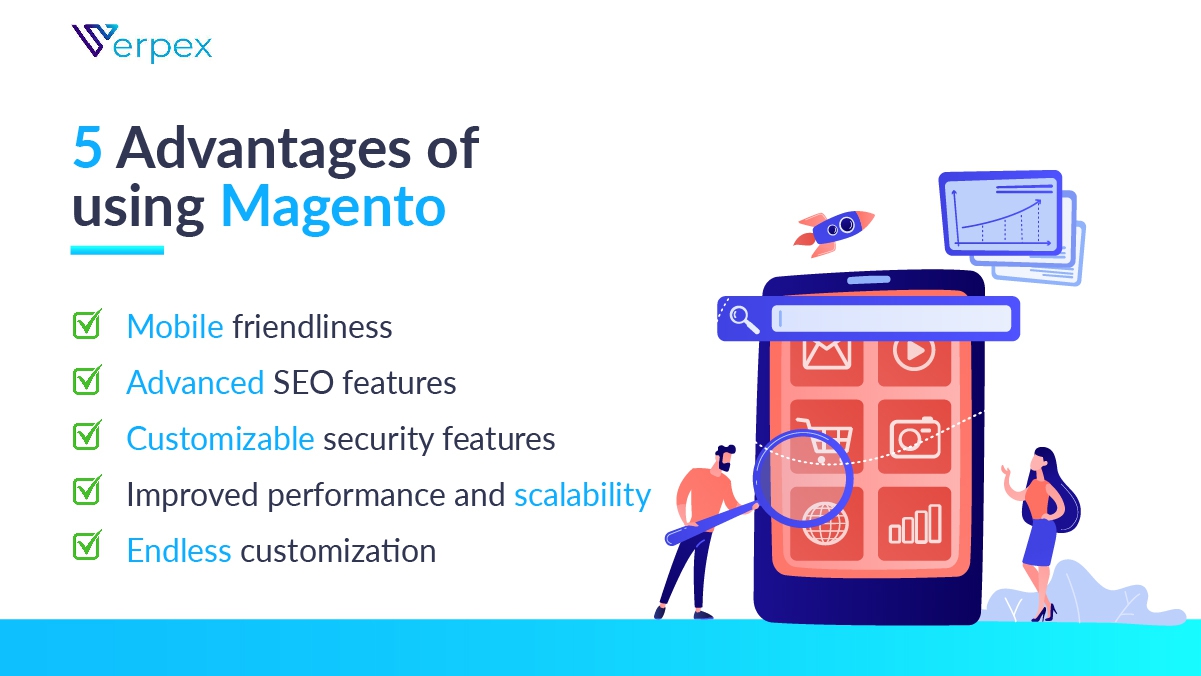Anyone that’s thinking about setting up an online store will have no doubt heard of Magento, but is it the right eCommerce store for your business? We take a look at how Magento works, how to host a store, and some of the top reasons you might want to use it.
What Is Magento?
Magento is an eCommerce platform that allows you to sell products and services via your website. It’s highly customizable and designed for large enterprise clients.
You might want to check out our guide to eCommerce stores to learn the basics before we look at Magento.
What Is Magento Hosting?
Magento hosting involves leasing space with a data center in order to create your online store. This is a vital requirement, and you won’t actually be able to sell anything without it.
Hosting platforms like Verpex can offer special managed web hosting plans that are compatible with e-commerce software Magento and look after all the technical and maintenance elements of your store.
Why Do You Need Magento Hosting?

Top Reasons to Use Magento for Your eCommerce Website
Highly customizable You can tweak and change just about every single aspect of your store. Fully personalizing it to your business
Handles huge traffic volumes
Perfect for large businesses that handle thousands of transactions per dayGreat scalability
The Magento store can be very easily scaled up to accept higher traffic volumes or scaled-down during dipsLarge range of features
With thousands of plug-ins and extensions on offer, plus the ability to change the code yourself, your store can do just about anything you want it toExtensive online community
Magento is open-source, meaning developers all across the globe are constantly working on updates and improvementsMobile-friendly
Magento is designed to work seamlessly on mobile devices, ensuring you don’t miss out on any sales via the mobile marketSEO-friendly
Magento works great for those looking to boost their rankings via SEO. You can play around with product meta tags, images and titles to name a few
Disadvantages of Using Magento
It requires developer skills
To get the most out of the platform you’re going to need some extensive coding skills, or hire the right expertise to optimize your storeIt can be expensive
A fully functioning Magento store with all the bells and whistles doesn’t come cheap. While hosting may start from $100 per month, it’ll cost upwards of $15,000 to get a good looking store up and runningYou may need dedicated servers
Running a Magento store takes some pretty hefty processing requirements to cover all those visitors. This means you’ll probably need expensive dedicated servers for the best performanceIt takes time to implement
Perfecting your store could take weeks, or even months, of tweaking and development work. Lots of companies actually implement Magento stores as a major project
Magento Community Vs. Magento Enterprise
Cost - Magento community is the free, open-source version of the software, while Enterprise is a managed version with a monthly cost based on the size of your organization
Technical support - With the community version you’re on your own in terms of support, and with Enterprise you get access to a team of Magento technical experts
Security - The community version of Magento isn’t PCI compliant, and you’ll need to plug other security gaps with your hosting provider. Magento enterprise on the other hand comes packed with additional features like regular scanning and PCI compliance
Performance - Community users on small websites won’t have an issue with performance, while Enterprise clients have performance tailored to the size of their site
Marketing and SEO - Enterprise represents a huge step up in terms of marketing and SEO tools on offer. You can still do a lot of this with the community version, but with Enterprise it’s far easier
Magento 1 Vs. Magento 2
Magento 1 is the older version of the platform that came to the end of its life in June 2020. Anyone on this version no longer gets access to updates, bug fixes, patches or new extensions.
Magento 2 is a total upgrade of the system packed with additional functionality.
Available Types of Magento Hosting

VPS
A virtual private server is a steap up from shared hosting and is the bare minimum you should consider to host a Magento site. You’ll be sharing space with other websites, but your resources are completely segregated, meaning other organizations using the server shouldn’t have any impact on your performance.
We’d recommend this type of hosting for small to medium-sized Magento stores.
Cloud Hosting
Another step up from VPS hosting and more easily scalable. With this type of hosting you’ll be sharing resources right across a whole data center. Processing power is applied using an on-demand basis so any spikes in traffic should be covered.
It tends to work on a pay-as-you-go basis too, meaning it shouldn’t become too pricey. That being said, you’re still sharing those resources with other organizations, so you might want to upgrade to another level if you’re expecting large amounts of traffic.
Dedicated hosting
The most expensive, and powerful, form of Magento hosting. Here you get your hands on an entire server all to yourself and have full control over the software you install on it. Plus, it’ll generally give you the fastest performance speeds.
However, they can be costly to run and you’ll need quite a bit of web hosting experience to run them effectively as you’ll be responsible for a lot of the security and updates.
It’s a good choice for very large businesses that know what they’re doing and have a good in-house web team.
Managed Magento Hosting or Unmanaged Magento Hosting?
Try Verpex Today!
20% Off
The First Month
Start now and get 20% off on the first payment!
Cost - Unmanaged hosting is certainly going to be a lot cheaper than managed, but you’ll need to provide technical skills yourself
Technical support - With managed hosting you get access to a knowledgeable team of experts. This means you don’t need to worry about fixing maintenance or technical issues
Security - Your managed host will take care of every security issue for you, including patches cyber defenses. With unmanaged hosting, you’re largely on your own
Backups - With managed hosting you’ll almost always be offered regular backups of data. Unmanaged hosting plans may cover it, or it might be entirely up to you to organize
Choosing Your Magento Hosting Provider: Top Considerations

Uptime
This should be a minimum of 99.99%, don’t even consider a hosting provider that can’t promise this

Reputation
A quick scan of customer reviews should tell you how reputable your host is

Storage limits
Review your traffic and bandwidth needs and see if there are packages available to meet them.

Security
Take a look at the security options on offer. These will be a lot more extensive if you choose managed hosting

Price
Most hosting packages start from around $100 per month for managed options, but prices can start to increase significantly the more bandwidth and storage space you need.

Performance
Slow sites translate into lost customers. Your package should have enough processing power to ensure optimum performance

Customer support
24/7 customer support is the gold standard in the hosting industry. Plus, if you’re going for a managed hosting plan you’ll need a team of dedicated experts too. Luckily, Verpex can offer both
Magento Alternatives - Ecommerce Builders
WooCommerce Vs. Magento
WooCommerce is a much more user-friendly, and more affordable, eCommerce platform. The two serve very different purposes, and WooCommerce is better suited for smaller businesses.


Magento Vs. Shopify
Shopify might just be the most user-friendly eCommerce platform on the market and is designed for brand new entrepreneurs and inexperienced developers. That means your customization options are much more limited than Magento and you won’t be able to have such a large store.
Summary
Magento is a great choice for those that have large online stores to run. There’s a reason it's one of the top choices for enterprise clients across the globe, and the sheer amount of customization and development opportunities really are impressive.
We’d advise going for a managed hosting option as you’re more likely to save money in the long run, and you can rest easy knowing security and server maintenance is taken care of.
That being said, Magento still isn’t an easy platform to get to grips with. Managed hosting or not, you’ll need to have some significant web development skills to get the most out of the platform.
Frequently Asked Questions
Can I use Magento for small businesses?
Of course. While the platform is perfect for enterprise clients, smaller organizations can still benefit from the highly customizable nature of the platform.
How many customers can a Magento store handle?
Managed hosting options are available that can handle thousands of store transactions per hour. In theory, there’s no limit to your customer numbers.
Is there a free version of Magento?
Yes, the community platform is free and open-source. However, you’ll need significant resources to develop the platform into a fully functioning store.
Can I use shared hosting with Magento?
While you can, we couldn’t recommend it. Shared hosting simply doesn’t have the processing power and bandwidth to efficiently run your store.

I've been navigating the web hosting waters for years now. As the Chief Editor at Verpex, I team up with some awesome writers to dish out the good stuff on hosting. Got a Master's in Journalism, so I always have an eye out for quality. Whether you're just dipping your toes or you're a seasoned surfer, I'm here to make everything web hosting feel like a breeze
View all posts by Julia Lozanov



















